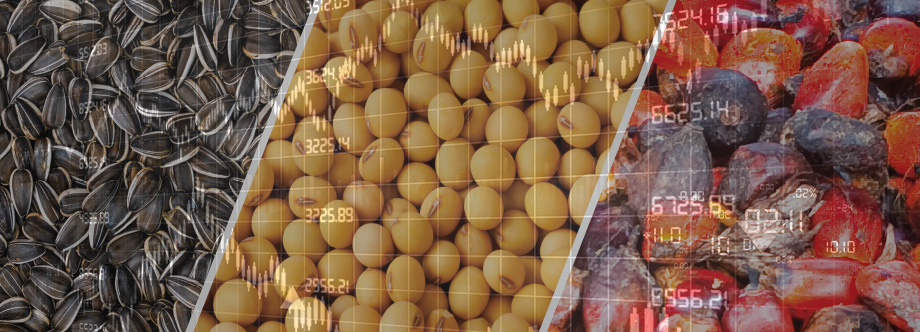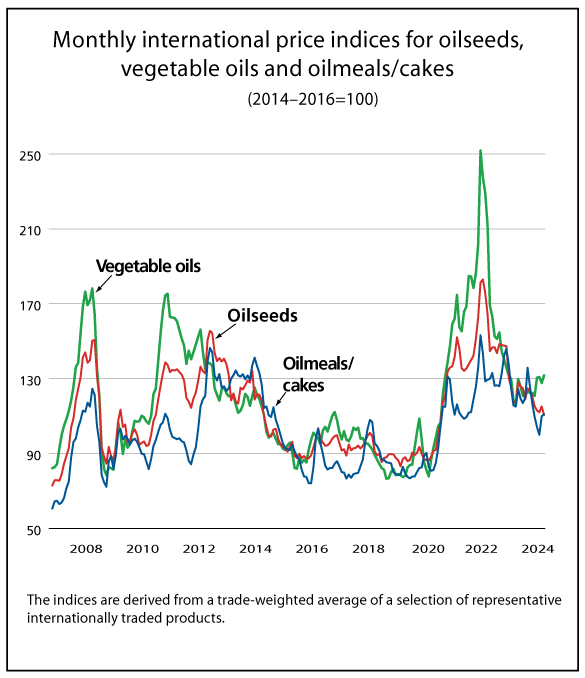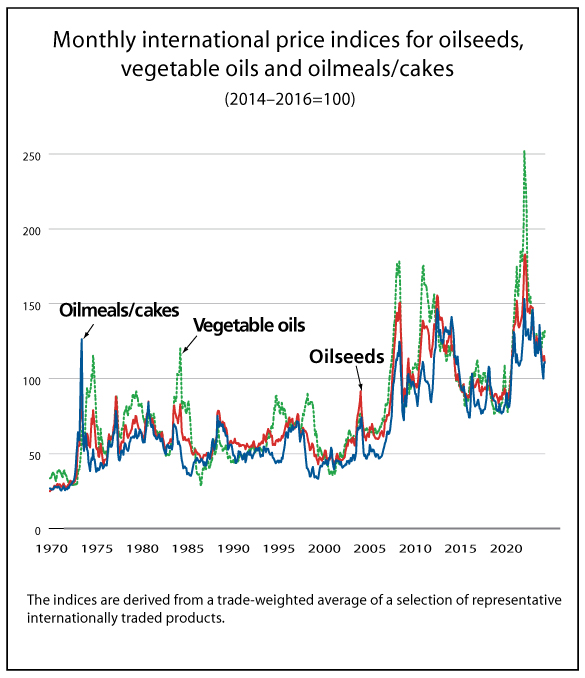FAO price indices for oilseeds, vegetable oils and oilmeals
In June 2024, the FAO price index* for oilseeds declined by 4.5 points (3.9 percent) month-on-month and marked the lowest level since November 2020. By contrast, the oilmeal and vegetable oil price indices increased, up, respectively, 1.1 and 4.0 points (1.0 and 3.1 percent) from May. While the indices for oilseeds and oilmeals remained below their year-earlier levels, the vegetable oil index rose to 13.8 percent above its June 2023 reading.
The renewed decline of the oilseed index mainly reflected lower soybean and rapeseed prices, more than offsetting higher sunflower seed quotations. After a short-lived rebound in May, international soybean prices declined by more than 5 percent in June, mostly underpinned by a favourable production outlook in the United States of America for the 2024/25 season. Moreover, protracted subdued import demand, outweighing the impact of firm uptake from the biofuel sector in the country, also weighed on soybean quotations. In South America, where harvesting operations concluded in June, despite localized production losses, ample supplies from the region also exerted downward pressure on world soybean values. In the meantime, international rapeseed prices contracted slightly, mainly reflecting largely conducive weather conditions for crop development in Canada. Towards the second half of June, however, rapeseed quotations recovered somewhat on lower crop prospects in the European Union, thus contained further price decline. By contrast, world sunflower seed prices rose for the second consecutive month, primarily underpinned by deteriorating weather conditions in parts of the Russian Federation, where yield potential is threatened by prolonged excessive dryness earlier in the year in the region.
With regard to oilmeals, the marginal increase of the price index was mainly driven by higher soymeal quotations. Albeit weighed by rising output amid ample global soybean supplies, international soymeal prices were supported by recovering global feed demand from the livestock industry. Meanwhile, prospects of tightening global supplies of sunflower meal in the 2024/25 season fuelled world prices of the product, while rapeseed meal quotations also remained higher than their year-earlier levels.
As for vegetable oils, the moderate increase of the price index was driven by higher quotations across palm, soy and sunflower oils, while rapeseed oil prices remained stable compared to May. After declining for two consecutive months, international palm oil prices rebounded in June, mainly underpinned by a reviving global import demand due to increased price competitiveness. Meanwhile, world soy and sunflower oil prices continued to rise, underpinned, respectively, by firm demand from the biofuel sector in the Americas and declining export availabilities in the Black Sea region. As regards rapeseed oil, international prices stayed practically stable in June, but markedly above their year-earlier levels amid a tightening global supply outlook for the 2024/25 season.
|
|
* The monthly Monthly Price Update is an information product provided by the oilseeds desk of the Markets and Trade Division of FAO. It reviews the development of international prices for oilseeds, oils and meals as reflected by FAO’s price indices. Previous issues can be downloaded from the FAO website at the following webpage: https://www.fao.org/markets-and-trade/publications/en/?querystring=oilseeds
Please note that the views expressed in this information product are those of the author(s) and do not necessarily reflect the views or policies of FAO.
Explanatory notes:
FAO's price indices are calculated using the Laspeyres formula; the weights used are derived from export values of each commodity for the 2014–16 period. The indices are based on the following international spot prices for nearest forward shipment (provided by Oil World):
- Components of the oilseeds price index: soybeans, US, cif Rotterdam; Copra Phil./Indo., cif NW Eur. port; rapeseed, Europe, 00, cif Hamburg; linseed, Canada, No.1, cif NW Eur. port; sunflower seed, fob Black Sea (please note that sunflower seed has been added to the index only in January 1976 and, until December 2012, referred to EU, cif Rotterdam).
- Components of the vegetable oils price index: soybean oil, Dutch, fob ex-mill; sun oil, EU, fob NW Eur. port; rape oil, Dutch, fob ex-mill; groundnut oil, any origin, cif Rotterdam; cotton oil, US, PBSY, fob Gulf; coconut oil, Phil./Indo., cif Rotterdam; palmkernel oil, Mal./Indo., cif Rotterdam; palm oil crude, cif NW Eur. port; linseed oil, any origin, ex-tank, Rotterdam; castor oil, ex-tank Rotterdam.
- Components of the meals/cakes price index: soy meal, 44/45%, fob ex-mill Hamburg; sun pell., 37/38%, Arg., cif Rotterdam; rape meal, 34%, fob ex-mill Hamburg; copra exp. pell., Phil., domestic; palmkernel exp., 21/23%, cif Rotterdam.





